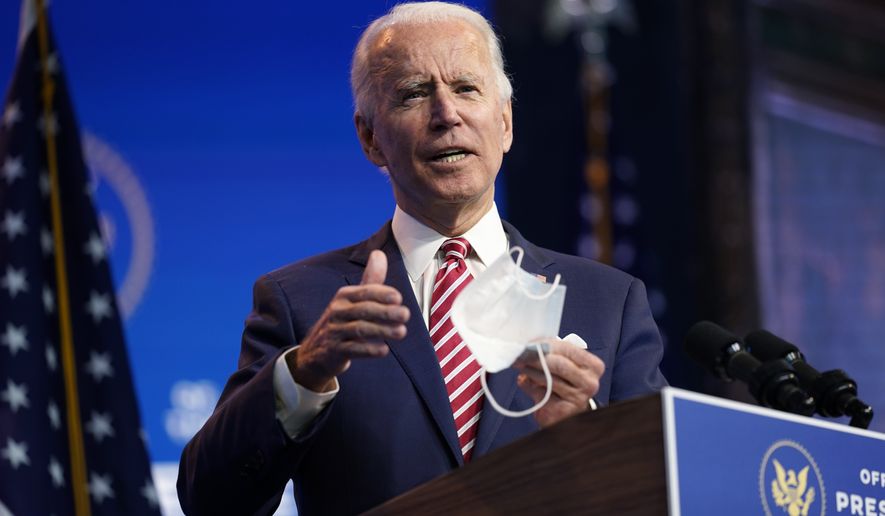Competing factions within the Democratic Party agree on one thing: Joseph R. Biden must raise taxes when he is in the White House.
Despite competing visions of how to accomplish a liberal agenda, the political left sees eye to eye on making a top priority of increasing revenue and reversing President Trump’s tax cuts.
Americans for Tax Fairness, a coalition with more than 420 national and state-based members, is gearing up for Mr. Biden to overhaul tax policy and follow through on other campaign promises.
“We will pull every lever we can to bring pressure on the administration to pursue its mandate,” said Frank Clemente, the group’s executive director. “We’re saying that he has a mandate on taxes, on what we call a ’fair-share tax system,’ and so we will bring in all the pressure we can from constituencies that helped elect him to demand that a fair-share tax mandate be pursued.”
Mr. Clemente said Mr. Biden needs to deliver on tax policy for Americans regardless of whether Senate Majority Leader Mitch McConnell and other Republicans remain in charge of the upper chamber of Congress.
Indeed, Mr. Biden’s big-spending agenda would require more revenue. The repeal of Republicans’ 2017 tax cuts, which Mr. Biden promised, would be a first step to pay the tab.
An analysis of Mr. Biden’s spending agenda by the James Madison Institute, a free-market think tank in Florida, estimated that the cost for taxpayers would be an extra $3.6 trillion per year.
Mr. Biden has pledged that his tax increases would not hit anyone earning less than $400,000 a year. He said he would put the squeeze instead on corporations, a target that liberals prefer.
His economic plan includes an increase in the corporate tax rate to 28% from 21% and a minimum tax of 15% on corporate income to ensure that no company can evade the IRS through loopholes.
“I think on the challenging side is normally you don’t raise taxes when the economy has crashed. But we’re not talking about raising taxes across the board,” Mr. Clemente said. “Biden’s proposal raises taxes on the richest Americans, and most of the richest Americans have done well, if not really well, during the pandemic.”
The coalition of Democrats poised to support Mr. Biden’s tax agenda includes moderates and looks near-universal.
Rep. Abigail Spanberger of Virginia, a member of House Democrats’ more conservative-minded Blue Dog Coalition, supports rolling back the Trump tax cuts. She said they help only wealthy individuals and corporations.
Echoing Mr. Biden, she promises no tax increases “on middle-class and working families.”
Sen. Joe Manchin III of West Virginia, who ranks as the most conservative Democrat in the Senate, signaled support for Mr. Biden’s fiscal agenda soon after Election Day.
“I’ve always said I’m fiscally responsible and socially compassionate,” Mr. Manchin said on “Face The Nation” on Nov. 8. “I believe most Americans are, my moderate Republican friends and moderate Democrats. We’ve got to govern from that middle, that moderate middle. Joe Biden has always been there. He knows how to work across the aisle. He’ll reach out first and make this Senate work and give it every chance he can.”
Grover Norquist, president of the conservative Americans for Tax Reform, said no Democrat will stand athwart tax increases.
“The issue that most divides Republicans and Democrats more than any other is taxes,” Mr. Norquist said. “There are some Democrats who will tell you they’re pro-life and may even vote pro-life, and there are some Democrats who won’t steal your guns … but there is no Democrat who won’t raise your taxes.”
Former Sen. Mark Pryor of Arkansas, who recently joined Brownstein Hyatt Farber Schreck, said he is excited about the potential for Mr. Biden to pull some Republicans into his corner to help him govern by consensus.
As a top-grossing federal lobbying firm in Washington, Brownstein likely will have input in fiscal policies moving through Congress. Mr. Pryor said he thinks his fellow Democrats will need to reverse components of the Republican tax cuts while making trade-offs with the GOP as part of budget negotiations.
“If you’re going to restore fiscal responsibility, or some might even say fiscal sanity, to our federal government, we’re going to have to have some revenue,” Mr. Pryor said. “We’re going to have to really watch our spending because even if we were able to miraculously balance the budget in the next few years, we still have trillions and trillions and trillions of dollars in deficit, in debt we’ve got to deal with.”
Precisely what sort of opportunity exists and how much time Democrats will have to raise taxes with Mr. Biden at the helm remain open questions.
Getting tax increases through a Republican-run Senate would be difficult.
Democrats are holding out hope of winning the Senate majority by winning the two runoff elections in Georgia, which would split the chamber 50-50 and give Democrats control with Kamala D. Harris, the presumed vice president, as the chamber’s tie-breaking vote.
Republicans would not be the only ones standing in the way if Mr. Biden looks to reach a bipartisan consensus for his agenda. His Democratic allies in Congress are coming under fire from the far left.
Groups including Justice Democrats and the Sunrise Movement issued a memo after the election calling for House Speaker Nancy Pelosi and other Democratic leaders to “be clear-eyed about their failures” to win down-ballot races.
If a Republican majority in the Senate impedes the ability of the far left to flex its muscle next year, then the rift in the Democratic Party could grow into an even bigger obstacle for Mr. Biden’s policy agenda.
• Ryan Lovelace can be reached at rlovelace@washingtontimes.com.




Please read our comment policy before commenting.